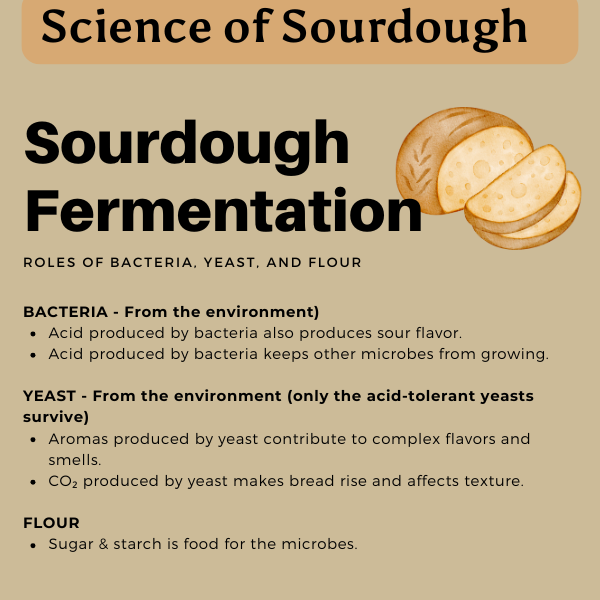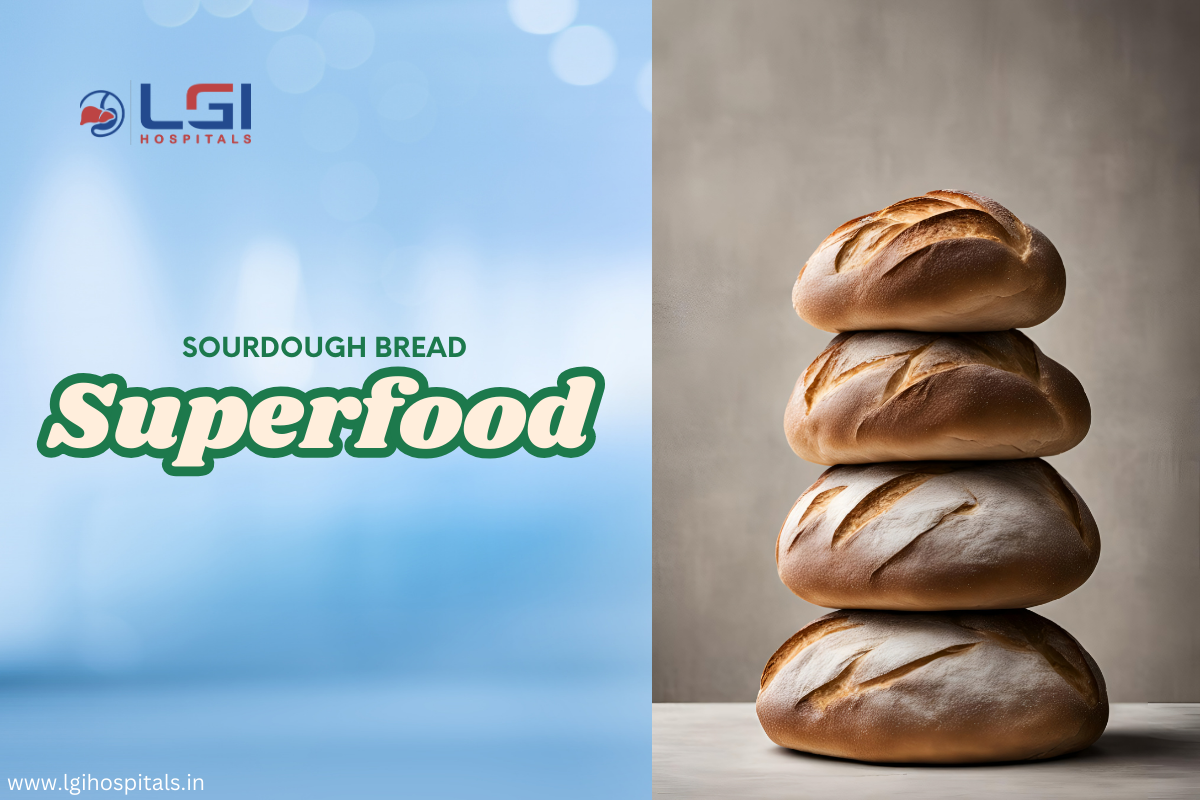In recent years, sourdough bread has gained a reputation as a go-to food for health-conscious individuals. With its tangy flavor and nutritional benefits, it’s no wonder that many people are incorporating it into their daily diets. Dr. Prashant Bhandarkar, a renowned medical expert with an MBBS and MD in General Medicine from Government Medical College, Nagpur, emphasizes the importance of maintaining a healthy gut for overall well-being. He recommends incorporating natural probiotics into the diet, and sourdough bread, with its probiotic properties, is a great addition to support digestive health.
What Is Sourdough Bread?
Sourdough bread is a type of bread that stands out due to its natural fermentation process. Unlike regular bread, which uses commercial yeast to rise, sourdough is made with wild yeast and lactic acid bacteria. This fermentation process is what gives sourdough its distinctive tangy flavor and also enhances its nutritional profile. The wild yeast and bacteria ferment the dough over an extended period, which not only improves the bread’s digestibility but also increases the availability of beneficial nutrients.
The Role of Probiotics in Digestive Health
Probiotics are live microorganisms that provide health benefits when consumed in adequate amounts. They are crucial for maintaining a balanced gut microbiome, which plays a significant role in digestion, immunity, and overall health. Dr. Prashant Bhandarkar advises including natural sources of probiotics like curd, kefir, and fermented vegetables in the diet to support gut health.
Due to its natural fermentation, sourdough bread is a rich source of probiotics. The lactic acid bacteria formed during the fermentation process can help maintain the balance of good bacteria in the gut, which is essential for efficient digestion and immune function.
How Sourdough Bread Benefits Digestive Health
Rich in Probiotic Bacteria: The live bacteria present in sourdough improve digestion by promoting healthy gut flora. This can help alleviate common digestive issues like bloating, gas, and indigestion.
Easier to Digest: The fermentation process breaks down phytic acid, which is present in many grains and can interfere with nutrient absorption. As a result, it is easier to digest and makes nutrients more accessible to the body.
Regulates Blood Sugar: It has a lower glycemic index compared to regular bread, meaning it doesn’t cause sharp spikes in blood sugar levels. This can be particularly beneficial for people managing blood sugar levels or those with diabetes.
Supports Gut Microbiota: Sourdough promotes a balanced and diverse gut microbiome, which is essential for overall gut health. A healthy microbiome supports digestion, immune function, and even mental health.

Sourdough vs. Regular Bread
While sourdough and regular bread may look similar, they offer different digestive benefits. Regular bread, made with commercial yeast, doesn’t undergo the same fermentation process, which means it doesn’t provide the same probiotic benefits. Additionally, sourdough bread is gentler on sensitive stomachs because the fermentation process breaks down gluten and other hard-to-digest compounds, making it easier to digest.
The unique combination of wild yeast and lactic acid bacteria in sourdough gives it a distinct advantage over regular bread in promoting digestive health. It’s not only easier on the stomach but also provides a variety of nutrients that regular bread cannot match.
Here’s a revised version of the nutritional classification with a focus on gut health and probiotic/prebiotic benefits:
| Nutritional/Gut Health Factor | Sourdough Bread | White Bread |
| Calories (per slice) | ~120-150 (varies with whole grain or white sourdough) | ~70-90 (lower due to refined flour, but less nutrient-dense) |
| Protein | ~4-5g (better protein digestibility due to fermentation) | ~2-3g |
| Fiber | ~2-3g (acts as a prebiotic, especially in whole-grain sourdough) | ~0.5-1g (low due to refined flour, minimal gut benefits) |
| Glycemic Index (GI) | Lower (~54) (fermentation reduces starches, stabilizing blood sugar) | Higher (~70-85) (refined starches spike blood sugar) |
| Prebiotics | High (fermentation creates compounds that support gut bacteria) | Low (refined flour lacks prebiotic compounds) |
| Digestibility | Gut-friendly: Fermentation breaks down gluten and phytic acid, aiding digestion | Harder to digest: Gluten and starches can cause bloating in some individuals |
| Mineral Absorption | Enhanced (fermentation neutralizes anti-nutrients like phytates) | Reduced (phytates remain, blocking mineral absorption) |
| Fermentation Benefits | Fermentation produces organic acids (e.g., lactic acid) that support gut health | No fermentation, no gut-enhancing properties |
| Impact on Gut Microbiota | Supports diverse gut bacteria via prebiotics and easier digestion | Limited or neutral effect on gut health |
| Nutritional/Gut Health Factor | Sourdough Bread | White Bread |
| Calories (per slice) | ~120-150 (varies with whole grain or white sourdough) | ~70-90 (lower due to refined flour, but less nutrient-dense) |
| Protein | ~4-5g (better protein digestibility due to fermentation) | ~2-3g |
| Fiber | ~2-3g (acts as a prebiotic, especially in whole-grain sourdough) | ~0.5-1g (low due to refined flour, minimal gut benefits) |
Additional Probiotic Foods to Consider
Incorporating other probiotic-rich foods into your diet can further enhance gut health. Dr. Prashant Bhandarkar recommends:
Curd/Yogurt: A staple in many diets, curd is rich in beneficial bacteria and can help support a healthy gut microbiome.
Kefir: A fermented milk drink, kefir contains a wide variety of probiotics and can be a powerful addition to your digestive health routine.
Fermented Vegetables: Foods like kimchi, sauerkraut, and pickles are excellent sources of probiotics that can complement sourdough bread for a well-rounded gut health diet.
Combining sourdough bread with these probiotic foods can help create a diverse range of beneficial bacteria in your gut, promoting better digestion and overall health.
Tips for Choosing or Making Sourdough Bread
When purchasing sourdough bread, it’s important to look for authentic, traditionally made loaves. Ensure the bread is free from preservatives and additives, as these can undermine the health benefits. The best sourdough are those made with organic ingredients and fermented naturally over an extended period.
If you’re feeling adventurous, you can also try making your sourdough bread at home. The process may take time and patience, but the results are well worth it. You can control the ingredients and fermentation process, ensuring a loaf that is both delicious and beneficial for your digestive health.

